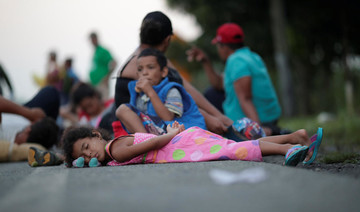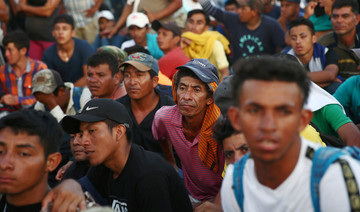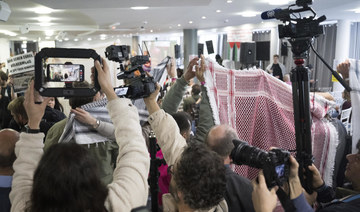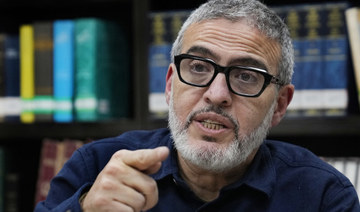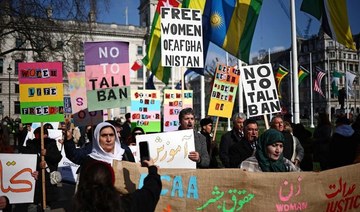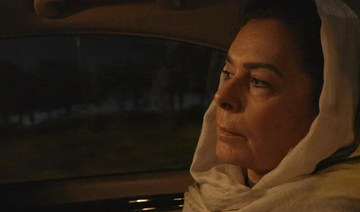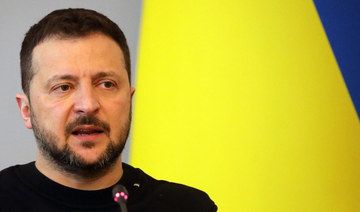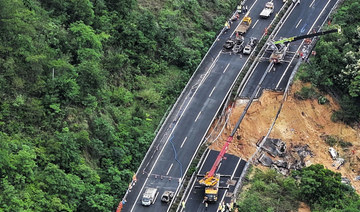HUIXTLA, Mexico: A deportee from the United States trying to get back to the life he spent more than a decade building. A woman whose soldier husband already is in the US with their 4-year-old son. A teenager desperate to earn money to support his diabetic mother back home.
The caravan of Central American migrants traveling through southern Mexico — estimated at around 7,000 people, nearly all Hondurans — has attracted headlines in the United States less than two weeks before Nov. 6 midterm elections.
But most of those walking through blistering tropical temperatures, sleeping on the ground in town squares and relying on donated food from local residents are unaware of US political concerns or even that there’s a vote coming up.
While they commonly cite the same core reasons for migrating — poverty, violence — their stories are deeply personal.
“My record is clean“
David Polanco Lopez, 42, is a former anti-narcotics officer from Progreso, Honduras. He’s traveling north in the caravan with his daughter Jenifer, 19, and his 3-year-old granddaughter, Victoria, whom the adults take turns pushing in a stroller.
Polanco came to the United States 13 years ago and applied for asylum after he was threatened by drug traffickers over his police work. He was given a court date, but he acknowledges he never showed up — in part because he didn’t understand the court document’s instructions, which were in English.
Polanco put down roots in Arizona: He married, and got a home. He thought that as long as he stayed out of trouble, he’d be fine.
“If they catch me committing a felony, then go ahead and kick me out,” Polanco said. “But my record is clean.”
He came to the attention of US immigration authorities three months ago when he caught a ride to work with a friend and Arizona police stopped them. Immigration officers later visited his home, he said, asked him to come outside and arrested him.
After being deported, he immediately turned around and headed back toward the United States with the caravan in hopes of rejoining his wife, who is from Mexico.
“I came (to the United States) fleeing the drug traffickers. The US police know that. They told me I qualified for asylum. But they didn’t give it to me,” Polanco said as he rested in the shade of a gas station in the far southern Mexican state of Chiapas. “I can’t live in Honduras because my life is in danger.”
Polanco said he will never give up on trying to return to the US That’s where his home, his family, his land are. He said he’s been paying US taxes for 13 years and never invested a cent in Honduras because “it’s unlivable, dangerous.”
“If they deport me I’ll just come back,” Polanco said, “because my place is there.”
“It's too much“
It’s been seven months since Alba Rosa Chinchilla Ortiz, a 23-year-old from Amapala in Honduras’ Valle department, has seen her 4-year-old son.
The boy’s father is an ex-soldier who — like Polanco — received death threats because of his job. Three times he survived attempts to kill him, Chinchilla said. He has applied for asylum in the United States and she’s trying to join him and their son.
Life on the road has been demanding. At one point, Chinchilla worried she was too exhausted to go any farther. She’s still moving forward, but fears dangers that may lie ahead — such as Mexican cartels, which have been known to kidnap, hold for ransom and kill migrants.
The separation has been almost more than she can bear.
“The desire to see my son is too much,” she said, speaking in the Mexican city of Huixtla, surrounded by dozens of fellow migrants and Mexican Red Cross workers.
Breaking into sobs, she wiped tears from her eyes with her thumb and forefinger.
“It’s the only thing that drives me,” Chinchilla said, “my son.”
’Treatment for my mother’
Reuniting with family in the US is something those on the road north frequently speak of. Marel Antonio Murillo Santos is doing the opposite — leaving his loved ones behind in Copan, Honduras.
After his parents separated five years ago, Murillo became the primary breadwinner for the family at age 13. His mom is diabetic, leaving her weak and missing a toe on each foot.
Dressed in a brown V-neck T-shirt, Murillo said he left with just 500 lempiras (about $20) in his pocket, a bit of clothing and a spare pair of shoes. He heard about the caravan from a friend, and decided on the spot to take off for the United States where he hopes to spend five years working and saving.
“What I want more than anything is to pay for treatment my mother needs for her health,” Murillo said. “Build a home for her, have a bit of money in the bank and also, if I’m able, invest in something or start a business for my mother to run.”
Mile after mile, this baby-faced young man, now 18 with a whispy black chin-beard, is constantly thinking of home and his mom and 5-year-old brother.
“When I go to eat, I wonder if they have eaten, where they are, if they are in good health,” Murillo said. “I spend all day thinking about them, until I close my eyes and sleep.”
’They're going to kill you’
If there’s any doubt about Honduras being a dangerous place, one need only talk to Joshua Belisario Sanchez Perez, a soft-spoken young man who worked odd jobs in the capital, Tegucigalpa. Back home, he had the misfortune of living in one of the most dangerous neighborhoods in a city full of them.
He spoke with The Associated Press in an interview this week that aired on TV back home, and afterward gang members showed up at his mother’s home angry that he had talked about the violence that forced him to flee.
“Because I had talked about all the gangs, and all the crime,” Sanchez said.
“My mother said, ‘They came to the house and they saw you on the news,’” he continued. “’If you come back they’re going to kill you.’“
For Honduran migrants in caravan, the journey is personal
For Honduran migrants in caravan, the journey is personal

- The caravan of Central American migrants traveling through southern Mexico has increased from 2,000 to 7,000 people, nearly all Hondurans.
- While they commonly cite the same core reasons for migrating — poverty, violence — their stories are deeply personal
London mayor Khan wins historic third term as Tories routed in local polls

In the West Midlands, where Tory incumbent Andy Street is bidding for his own third term, votes were reportedly being recounted and too close to call
LONDON: London’s Labour mayor Sadiq Khan on Saturday secured a record third term, dealing the Conservatives another damaging defeat in their worst local election results in recent memory months before an expected general election.
Khan, 53, easily beat Tory challenger Susan Hall to scupper largely forlorn Tory hopes that they could prise the UK capital away from Labour for the first time since 2016.
The first Muslim mayor of a Western capital when first elected then, he had been widely expected to win as Labour surge nationally and the Conservatives suffer in the polls.
In the end, he saw his margin of victory increase compared to the last contest in 2021.
It adds to a dismal set of results for Prime Minister Rishi Sunak, as his Tories finished a humiliating third in local council tallies after losing nearly 500 seats in voting Thursday across England.
With Labour making huge gains, the beleaguered leader’s Conservatives lost crunch mayoral races in Manchester, Liverpool, Yorkshire as well as the capital and elsewhere.
In the West Midlands, where Tory incumbent Andy Street is bidding for his own third term, votes were reportedly being recounted and too close to call.
An unexpected Tory defeat there could leave Sunak with only one notable success: its mayor winning a third term in Tees Valley, northeast England — albeit with a vastly reduced majority.
Writing in Saturday’s Daily Telegraph, Sunak conceded “voters are frustrated” but insisted “Labour is not winning in places they admit they need for a majority.”
“We Conservatives have everything to fight for,” Sunak argued.
Labour, out of power since 2010 and trounced by Boris Johnson’s Conservatives at the last general election in 2019, also emphatically snatched a parliamentary seat from the Conservatives.
It seized on winning the Blackpool South constituency and other successes to demand a national vote.
“Let’s turn the page on decline and usher in national renewal with Labour,” party leader Keir Starmer told supporters Saturday in the East Midlands, where the party won the mayoral race.
Sunak must order a general election be held by January 28 next year at the latest, and has said he is planning on a poll in the second half of 2024.
Labour has enjoyed double-digit poll leads for all of Sunak’s 18 months in charge, as previous Tory scandals, a cost-of-living crisis and various other issues dent the ruling party’s standing.
On Thursday, they were defending nearly 1,000 council seats, many secured in 2021 when they led nationwide polls before the implosion of Johnson’s premiership and his successor Liz Truss’s disastrous 49-day tenure.
With almost all those results in by Saturday afternoon, they had lost close to half and finished third behind the smaller centrist opposition Liberal Democrats.
If replicated in a nationwide contest, the tallies suggested Labour would win 34 percent of the vote, with the Tories trailing by nine points, according to the BBC.
Sky News’ projection for a general election using the results predicted Labour will be the largest party but short of an overall majority.
Its by-election scalp in Blackpool — on a mammoth 26-percent swing — was the Conservatives’ 11th such loss in this parliament, the most by any government since the late 1960s.
Speculation has been rife in Westminster that restive Tory lawmakers could use the dire local election results to try to replace him. But that prospect seems to have failed to materialize.
However, it was not all good news for Labour.
The party lost control of one local authority, and suffered some councillor losses to independents elsewhere, due to what analysts said was its stance on the Israel-Hamas war.
Polling expert John Curtice assessed there were concerning signs for the opposition.
“These were more elections in which the impetus to defeat the Conservatives was greater than the level of enthusiasm for Labour,” he noted in the i newspaper.
“Electorally, it is still far from clear that Sir Keir Starmer is the heir to (Tony) Blair.”
A British-Palestinian doctor was denied entry to France for a Senate meeting about the war in Gaza
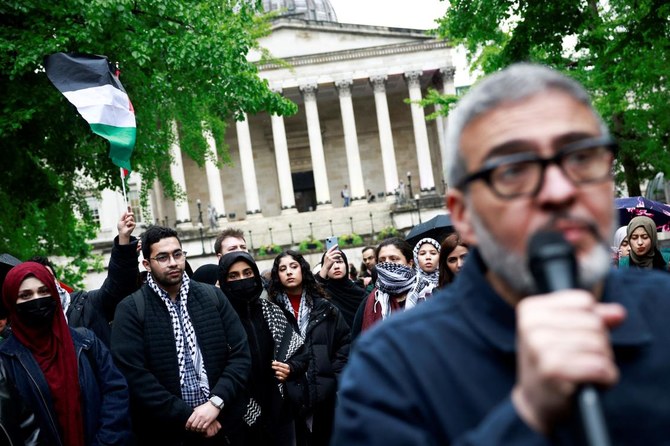
- Dr. Ghassan Abu Sitta was placed in a holding zone in the Charles de Gaulle airport and will be expelled, according to French Sen. Raymonde Poncet Monge
- Abu Sitta posted on social networks that he was denied entry in France because of a one-year ban by Germany on his entry to Europe
PARIS: A well-known British-Palestinian surgeon who volunteered in Gaza hospitals said he was denied entry to France on Saturday to speak at a French Senate meeting about the Israel-Hamas war. Authorities wouldn’t give a reason for the decision.
Dr. Ghassan Abu Sitta was placed in a holding zone in the Charles de Gaulle airport and will be expelled, according to French Sen. Raymonde Poncet Monge, who had invited him to speak at the Senate.
‘’It’s a disgrace,’’ she posted on X.
Abu Sitta posted on social networks that he was denied entry in France because of a one-year ban by Germany on his entry to Europe. Germany denied him entry last month, and France and Germany are part of Europe’s border-free Schengen zone. He posted Saturday that he was being sent back to London.
The French Foreign Ministry, Interior Ministry, local police and the Paris airport authority would not comment on what happened or give an explanation.
Abu Sitta had been invited by France’s left-wing Ecologists group in the Senate to speak at a colloquium Saturday about the situation in Gaza, according to the Senate press service. The gathering included testimony from medics, journalists and international legal experts with Gaza-related experience.
Last month Abu Sitta was denied entry to Germany to take part in a pro-Palestinian conference. He said he was stopped at passport control, held for several hours and then told he had to return to the UK He said airport police told him he was refused entry due to “the safety of the people at the conference and public order.”
Abu Sitta, who recently volunteered with Doctors Without Borders in Gaza, has worked during multiple conflicts in the Palestinian territories, beginning in the late 1980s during the first Palestinian uprising. He has also worked in other conflict zones, including in Iraq, Syria and Yemen.
France has seen tensions related to the Mideast conflict almost daily since the deadly Oct. 7 Hamas incursion into Israel. In recent days and weeks police have cleared out students at French campuses holding demonstrations and sit-ins similar to those in the United States.
Afghanistan’s only female diplomat resigns in India after gold smuggling allegations
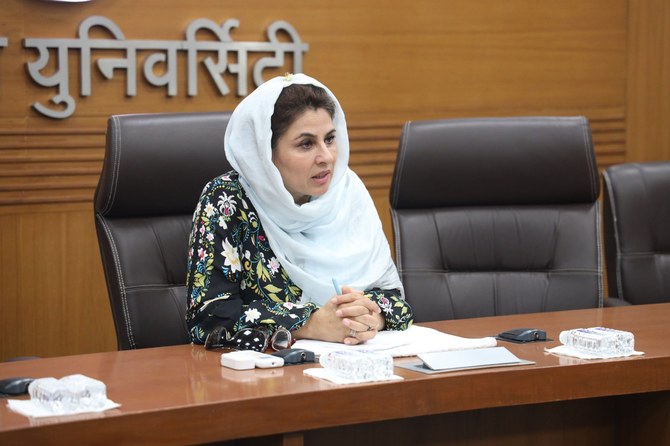
- Zakia Wardak, the Afghan consul-general for Mumbai, announced her resignation on her official account on the social media platform X
- According to Indian media reports, she has not been arrested because of her diplomatic immunity
ISLAMABAD: Afghanistan’s diplomat in India, who was appointed before the Taliban seized power in 2021 and said she was the only woman in the country’s diplomatic service, has resigned after reports emerged of her being detained for allegedly smuggling gold.
Zakia Wardak, the Afghan consul-general for Mumbai, announced her resignation on her official account on the social media platform X on Saturday after Indian media reported last week that she was briefly detained at the city’s airport on allegations of smuggling 25 bricks of gold, each weighing 1 kilogram (2.2 pounds), from Dubai.
According to Indian media reports, she has not been arrested because of her diplomatic immunity.
In a statement, Wardak made no mention of her reported detention or gold smuggling allegations but said, “I am deeply sorry that as the only woman present in Afghanistan’s diplomatic apparatus, instead of receiving constructive support to maintain this position, I faced waves of organized attacks aimed at destroying me.”
“Over the past year, I have encountered numerous personal attacks and defamation not only directed toward myself but also toward her close family and extended relatives,” she added.
Wardak said the attacks have “severely impacted my ability to effectively operate in my role and have demonstrated the challenges faced by women in Afghan society.”
The Taliban Foreign Ministry did not immediately return calls for comment on Wardak’s resignation. It wasn’t immediately possible to confirm whether she was the country’s only female diplomat.
She was appointed consul-general of Afghanistan in Mumbai during the former government and was the first Afghan female diplomat to collaborate with the Taliban.
The Taliban — who took over Afghanistan in 2021 during the final weeks of US and NATO withdrawal from the country — have barred women from most areas of public life and stopped girls from going to school beyond the sixth grade as part of harsh measures they imposed despite initial promises of a more moderate rule.
They are also restricting women’s access to work, travel and health care if they are unmarried or don’t have a male guardian, and arresting those who don’t comply with the Taliban’s interpretation of hijab, or Islamic headscarf.
Russia puts Ukraine's Zelensky on wanted list, TASS reports
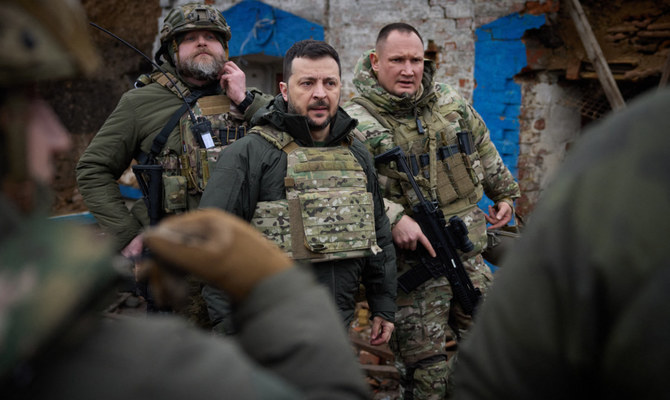
- Russia has issued arrest warrants for a number of Ukrainian and other European politicians
MOSCOW: Russia has opened a criminal case against Ukrainian President Volodymyr Zelensky and put him on a wanted list, the state news agency TASS reported on Saturday, citing the Interior Ministry's database.
The entry it cited gave no further details.
Russia has issued arrest warrants for a number of Ukrainian and other European politicians since the start of the conflict with Ukraine in February 2022.
Russian police in February put Estonian Prime Minister Kaja Kallas, Lithuania's culture minister and members of the previous Latvian parliament on a wanted list for destroying Soviet-era monuments.
Russia also issued an arrest warrant for the International Criminal Court (ICC) prosecutor who last year prepared a warrant for President Vladimir Putin on war crimes charges.
A Chinese driver is praised for helping reduce casualties in a highway collapse that killed 48
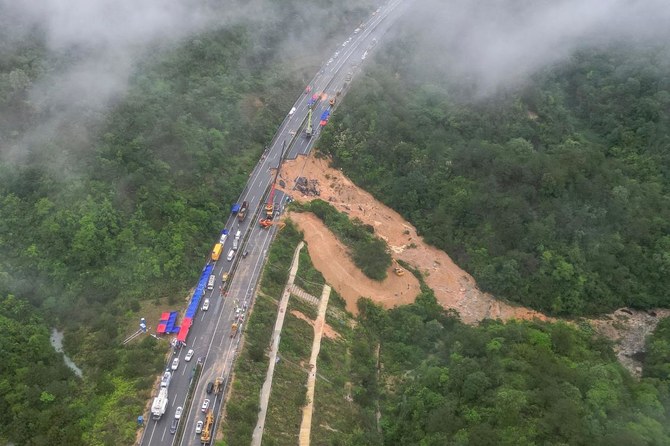
- Reacting swiftly, Wang, a former soldier, positioned his truck to block the highway, effectively stopping dozens of vehicles from advancing into danger
- His wife got out of the truck to alert other drivers about the situation
BEIJING: A Chinese truck driver was praised in local media Saturday for parking his vehicle across a highway and preventing more cars from tumbling down a slope after a section of the road in the country’s mountainous south collapsed and killed at least 48 people.
Wang Xiangnan was driving Wednesday along the highway in Guangdong province, a vital economic hub in southern China. At around 2 a.m., Wang saw several vehicles moving in the opposite direction of the four-lane highway and a fellow driver soon informed him about the collapse, local media reported.
Reacting swiftly, Wang, a former soldier, positioned his truck to block the highway, effectively stopping dozens of vehicles from advancing into danger, Jiupai News quoted Wang as saying. Meanwhile, his wife got out of the truck to alert other drivers about the situation, it said.
“I didn’t think too much. I just wanted to stop the vehicles,” Wang told the Chinese news outlet.
Wang’s courageous actions not only garnered praise from Chinese social media users but also recognition from the China Worker Development Foundation.
The foundation announced Friday that in partnership with a car company it had awarded Wang 10,000 yuan ($1,414). A charity project linked to tech giant Alibaba Group Holding also gave an equal amount to Wang, newspaper Dahe Daily reported. Wang told the newspaper he would donate the money to the families of the collapse victims.
Local media also reported that another man had knelt down to prevent cars from proceeding on the highway.
The accident came after a month of heavy rains in Guangdong. Some of the 23 vehicles that plunged into the deep ravine burst in flames, sending up thick clouds of smoke.
About 30 people were hospitalized. On Saturday, one was discharged from the hospital, state broadcaster CCTV reported. The others were improving, but one remains in serious condition.
On Saturday, the Meizhou city government in Guangdong said in a statement that authorities would conduct citywide checks on expressways, railways and roads in mountainous areas. A team led by the provincial governor is investigating the cause of the collapse, Southcn.com reported.
The Chinese government had sent a vice premier to oversee recovery efforts and urged better safety measures following calls by President Xi Jinping and the Communist Party’s No. 2 official, Premier Li Qiang, to swiftly handle the tragedy.
The dispatch of Zhang Guoqing, who is also a member of one of the ruling Communist Party’s leading bodies, illustrates the concern over a possible public backlash over the disaster, the latest in a series of deadly infrastructure failures.


